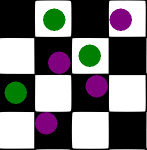Aus_Snow
First Post
So, I played a bit of chess (not much) quite a few years back. The guy I learned from didn't really know that much - en passant would've been news to him, for example. But I quickly got the hang of how things moved, a few good openings, the usual.
Recently, I made a decision to learn. . . well, properly (I hope). I'd like to be able to play well at all times, rather than OK-ish when not significantly challanged. Not that I've played against other people for years (or played many games in my life, full stop, for that matter) - I've started again, but this time playing the CPU for a while first. Only a couple of people I know might be up for a game here and there, but I'm sure I can find some other good players. . . once I feel that I'm up to the task!
Which brings me to the point: Are there any resources the chess players among you would recommend (e.g., books on the subject) ? A few interesting websites have come up in my searches, so those are bookmarked, but I'm open to more of those, if any particularly stand out. I have a strong feeling at least someone will say that I must simply play more. And that's undeniably true, but knowledge also goes a long way.
I suppose the other question on my mind will be kind of answered by virtue of the number of forumites replying. But still, how many EN Worlders are into chess anyway? Many of you? And, while I'm asking that, is it more or less popular in general these days?
Pretty sure that's all for now.
Recently, I made a decision to learn. . . well, properly (I hope). I'd like to be able to play well at all times, rather than OK-ish when not significantly challanged. Not that I've played against other people for years (or played many games in my life, full stop, for that matter) - I've started again, but this time playing the CPU for a while first. Only a couple of people I know might be up for a game here and there, but I'm sure I can find some other good players. . . once I feel that I'm up to the task!
Which brings me to the point: Are there any resources the chess players among you would recommend (e.g., books on the subject) ? A few interesting websites have come up in my searches, so those are bookmarked, but I'm open to more of those, if any particularly stand out. I have a strong feeling at least someone will say that I must simply play more. And that's undeniably true, but knowledge also goes a long way.
I suppose the other question on my mind will be kind of answered by virtue of the number of forumites replying. But still, how many EN Worlders are into chess anyway? Many of you? And, while I'm asking that, is it more or less popular in general these days?
Pretty sure that's all for now.

